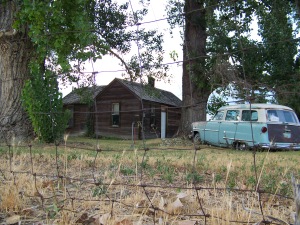Fifteen years ago we fended off the rerouting of State Road 36. It would have cut through farms, a pioneer cemetery, wetlands, and historic homes. It was in this context that I met Lucille, an 80-year-old Erda native with an undeserved reputation for orneriness. She was, in point of fact, mild and sweet. This poem tells of my brief but lasting intersection with Lucille. (See the post Chapter 36: Shirley and Lucille for more about Lucille and her sister Shirley.)
LUCILLLE
Her cottage sits small
in the big shade of three
old cottonwoods that now, late
Spring, release bushels of cottony
seeds that ride the breeze,
settling in wispy blanketings
on roads and lawns, houses, and fields.
churned up by cars
in swirling white clouds
that float off to land where they will:
on the ground again,
on trees and flowers,
on barbed wire prongs,
and in my hair.
In the shade
the cottage’s weathered clapboards
glower dark, as if soaked
in creosote, matching the nearby privy
planks. A lifetime of bundling
up, kicking through feet
of newly-fallen snow, to sit
on the icy privy seat.
Firewood leans tired
against the cottage clapboards,
log ends covered in dusty spider webs.
The blackened chimney top
misses Winter’s fires.
New grass covers
the privy pathway.
Lucille did have running water.
I saw the chipped enamel sink once,
from the porch,
when she answered the door.
Water dripped steadily
from the rusted faucet head.
Her bed huddled in the corner,
a thin mattress pressing rusty coils,
opposite the sink
in the two-room shack.
Lucille hunched in the doorway,
against the frame,
her unkempt hair streaked gray and white,
matted from undisturbed sleep.
“We’re having a meeting tonight, about
the road.
You’re welcome to come,
if you want.
I wanted you to know.”
“Are these your children?”
Her hairy chin-mole moved
a little as she smiled,
revealing toothless gums.
“Yes, ma’am, these are my children.”
“You have beautiful children,” she crooned.
“Thank you, ma’am,” I offered meekly.
“Thank you,” she softly offered in-kind,
withdrawing gingerly,
with my letter and maps,
into the shadows of her home.
The new state road, I feared,
would destroy her old cottage,
would tear through the oat fields
that her nephews farm.
I regret
never visiting Lucille before.
I regret
listening to the neighbors
about how ornery and crotchety she was,
about how curmudgeonly she was
toward visitors.
We knocked on her door
and asked if she wanted to
buy some Girl Scout cookies
and she practically chased us
away scolding, ‘I don’t want any
cookies’ they had said.
As it turns out,
Lucille was just as nice as could be,
simply old and tired and lonely.
Perhaps she wished that someone
would come visit her,
someone that didn’t want
anything,
someone that might say,
Hello, Lucille.
It’s a beautiful day.
And how are you getting along?
I regret
that I never saw Lucille again.
She died and was buried before I knew.
We held the community meeting about
the road,
at my house.
Most of the neighbors came
and talked for hours.
“The road
will desecrate
an unmarked pioneer cemetery,”
one neighbor asserted.
“My grand-daddy told me once
where he thought it was.”
“The environmental assessment for
the road
is totally inadequate and entirely suspect,”
a man declared.
“It fails to account for wetlands and species mitigation,
and fails to identify potential alternate routes.”
“This is Erda!”
bemoaned an old farmer’s wife.
“We’ve been cultivating our ground
for generations.
The road
will take that all away.”
“It’s no use bickerin’,”
cranked a cynical old rancher.
“The State will put
the road
where the State damn well wants to,
and there’s nothin’ we can do about it.”
The old ranchers and farmers,
and the new-comers, too,
designated me their voice,
to write to the Governor about
the road.
He had proclaimed, after all,
this year to be
the year of the Utah farmer.
The new road,
as planned, would decimate
some of Erda’s best farmland.
I received no gubernatorial reply—
but Lucille’s cottage still hides
in the cottonwood shadows.
Some kin replaced
the weathered wooden door
with a new door painted white,
like a gaudy, too-big bandage
on a fairly minor bruise.
Otherwise, the cottage withstands time.
The little No Trespassing sign clings
crookedly to the rusty field fence;
the house gate long since fell off.
Artesian water squirts feebly
from the rusty yellow sprinkler,
lying always in the same spot,
growing a circle of lush green
against the adjacent dormant brown.
In the front lawn,
the finned ’56 Ford station wagon
has kept patient watch for decades.
Weeds climb past its flat, cracked whitewalls
and faded blue-sky paint.
The rear window is shattered still;
the others remain intact.
And after every Spring thaw,
the crocuses, daffodils, and tulips
rise through the turf by the thousands,
waiving yellow, red, pink, and purple,
perfuming the air and
bringing life and color
to the empty cottage
where Lucille lived.


A beautifully told story. Thank you, Roger.
LikeLiked by 1 person
I am glad you liked it. When Shirley and Lucille, both humble women, left this world, they left no visible mark. But their lives and contributions were just as meaningful, if not more so, than those of kings and presidents.
LikeLike